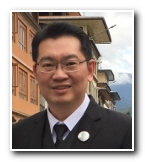Health Reform: Perspectives from the Thai Experience
Abstract
Thailand has performed admirably in its health reform over the last few decades and achieved universal health insurance. The challenges now faced by Thailand are similar to most developed countries; an ageing and increasingly urban population reflecting adult mortality and risk factors of an upper-middle income population and the need to modify institutional structures to reflect these changing circumstances. The approach to these challenges has focused on the move to District Health Systems as the access point to healthcare and the service delivery structure demands competent qualified leadership and management. The main concept of this approach is relevant to the concept and principle of the WHO’s DHS development based on primary health care as specified in the Harare Declaration signed in 1987. The aims of this concept are to improve quality of life of people and to encourage people to have better self-care and to look after each other in their own communities. This approach provides recognition of the need to build the capacity and capability of health professionals in the management and leadership of health systems. The purpose of this paper is to discuss the current initiatives in reforming the Thai health system at the district level by improving quality of primary care services and strengthening governance and management capacity of district health boards in order to meet the concept of DHS development. Also, this paper will discuss the role of the recently established College of Health Systems Management of Naresuan University, Thailand in those initiatives within the context of attaining Sustainable Development Goals (SDGs) implementation.

Assistant to the President, Comprehensive Operations, Naresuan University
Assistant Professor, College of Health Systems Management,
Naresuan University (NU)
Programme
-
Plenary Session I
Moderators:
Dr SH Liu, President, Hong Kong College of Health Service Executives &
Dr Ben Fong, Senior Lecturer, PolyU SPEED - Plenary Session I (a)
- Plenary Session I (b) (i)
- Plenary Session I (b) (ii)
- Plenary Session I (c)
-
Plenary Session II
Moderators:
Prof. Maurice Yap, Dean, Faculty of Health and Social Sciences, PolyU &
Prof. Warren Chiu, Associate Dean, CPCE, PolyU - Plenary Session II (a)
- Plenary Session II (b)
- Plenary Session II (c)
- Parallel Sessions




